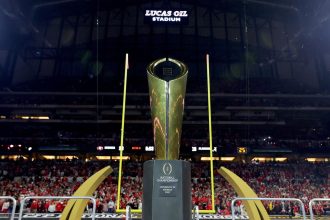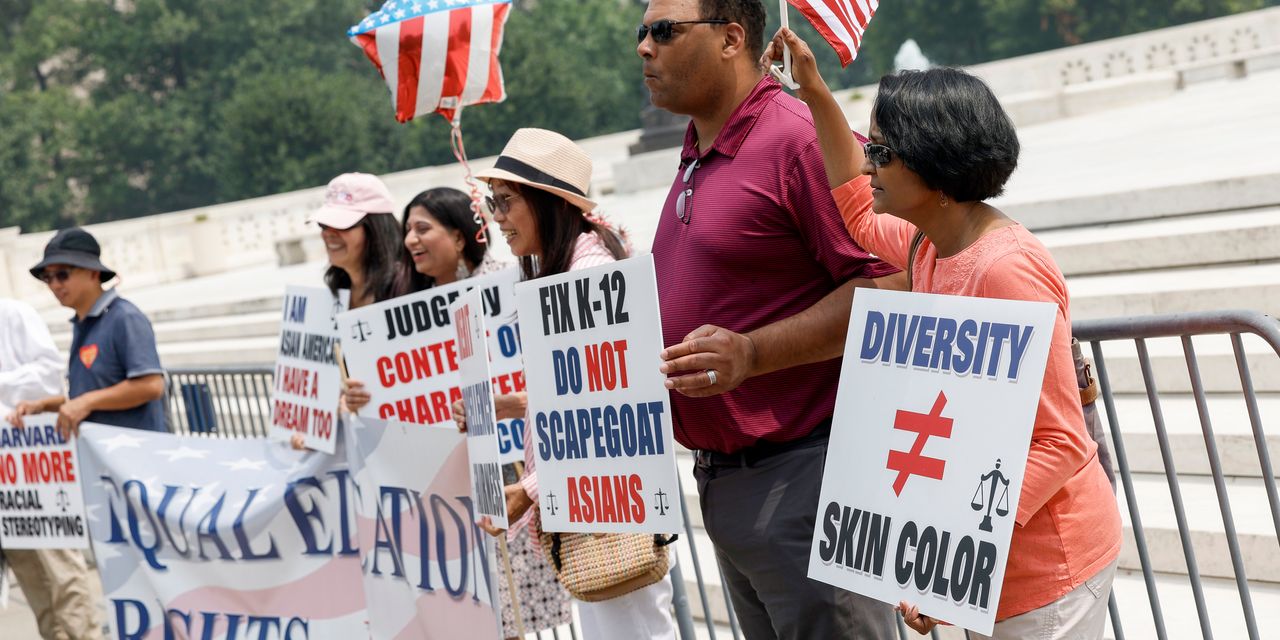The Supreme Court’s controversial decision striking down affirmation action in college admissions has sparked plenty of outraged responses and concerns about setting back diversity efforts. But recent polling suggests that a slight majority of Americans do support the affirmative-action ruling.
A new ABC News/Ipsos poll of more than 900 adults conducted June 30 through July 1 — just after the Supreme Court struck down affirmative action in admissions — found that 52% of Americans approved of the high court’s action, with about a third disapproving of the decision. And 16% of respondents said that they didn’t know whether they approved or disapproved of ending affirmative action.
These opinions — similar to the positions of the high-court justices themselves, based on the party of the president nominating them to the court — were largely split along political party lines.
Last Thursday, the Supreme Court’s conservative majority ruled 6–3 against the admissions approaches at Harvard University and the University of North Carolina. Chief Justice John Roberts said that universities have “concluded, wrongly, that the touchstone of an individual’s identity is not challenges bested, skills built, or lessons learned but the color of their skin.” But counterarguments from the liberal dissenters on the Supreme Court, including Justice Sonia Sotomayor, expressed concern that this decision “rolls back decades of precedent and momentous progress.”
Similarly, in the ABC News/Ipsos poll, most surveyed Republicans (75%) and independents (58%) approved of ending affirmative action, while only 26% of Democrats agreed with that decision.
Related: Affirmative action ends: President Biden, Michelle Obama, Cory Booker call Supreme Court ruling a ‘devastating blow’ to education
There were also “deep divisions between racial groups,” the poll noted, with only 25% of Black respondents supporting the decision to end affirmative action, compared with 60% of white and 58% of Asian respondents. Hispanic respondents were evenly split, with 40% approving and 40% disapproving.
And this aligns with the polling data collected by forecasting website FiveThirtyEight. One April 2023 survey done by researchers at Harvard, Stanford and the University of Texas, and reported by the New York Times, found that strong majorities of Americans agreed that public (74%) and private (69%) colleges and universities should not be able to use race as a factor in admissions.
Yet FiveThirtyEight noted that an April 2022 YouGov poll that phrased the question differently — reminding respondents that affirmative action is intended to increase the numbers of Black, Hispanic and other underrepresented groups on elite campuses — drew more support. In this YouGov poll last year, a roughly equal share of people said they supported (35%) and opposed (36%) affirmative action in college admissions.
“Support for affirmative action varied based on how the question was asked, and likely what assumptions or implications that wording carried with it,” the poll noted. For example, when asked, “How much should colleges consider race and ethnicity when deciding who to admit,” 63% of respondents answered, “not at all.” But when the same respondents were asked, “Would you support or oppose an affirmative-action program for higher education that increases the share of Black and Hispanic students at selective institutions in the United States,” 37% supported it, while 34% opposed it.
Related: Supreme Court ended affirmative action at colleges. That could harm companies’ diversity efforts.
There’s other polling to suggest that the American public is conflicted or confused about how to increase diversity in higher education without factoring race into admissions. For example, a June 2023 CBS News poll taken before the Supeme Court’s affirmative-action ruling found that, while a slight majority of Americans (53%) thought affirmative action programs should still be continued, 70% of the same respondents also said that colleges should not be allowed to consider race in admissions.
A Pew Research Center poll conducted this spring also found half of U.S. adults (50%) disapproved of selective colleges and universities considering race and ethnicity in their admissions decisions. But on the flip side, a recent NPR/PBS NewsHour/Marist poll found that 57% of respondents felt affirmative-action programs absolutely should still continue in hiring, promoting and college admissions, compared with 38% who disagreed overall. This was also politically split, as 78% of Democrats supported affirmative action, compared with just 33% of Republicans.
Most people in the new ABC News/Ipsos poll didn’t think the current Supreme Court justices are ruling objectively; 53% said they think that the Supreme Court justices are making decisions “mainly on the basis of their partisan political views,” which is up 10 points from when the same question was asked in January 2022. Just 33% said they believe that Supreme Court justices are ruling on the basis of the law, and 14% said they don’t know. When this is looked at along political party lines, most Democrats (76%) and independent voters (51%) think the Supreme Court rules based on partisan political views, whereas just 36% of Republicans feel the same way.
The NPR/PBS NewsHour/Marist poll reached a similar conclusion. Some 59% of respondents said they have “very little or no confidence at all in the Supreme Court,” compared with 39% who do still have faith in the highest court in the land. Most Republicans here said they have confidence in the Supreme Court (53%), but 62% of independents and 61% of women who live in small cities and suburbs said they do not.
More on affirmative action and the Supreme Court decision from MarketWatch:
As Supreme Court strikes down affirmative action, the push to end legacy admissions may gain momentum
How college admissions will change in America after the Supreme Court knocked down affirmative action
Supreme Court’s ruling against affirmative action leaves defense-related loophole
Read the full article here





